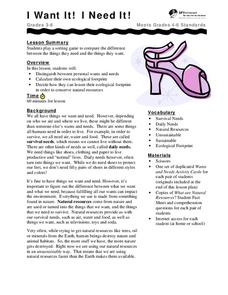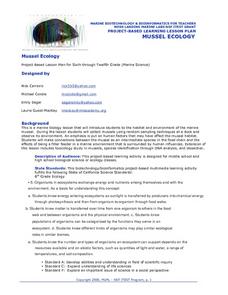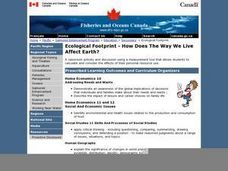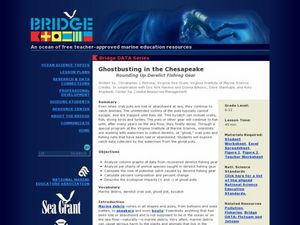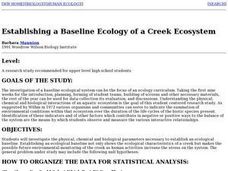Curated OER
Ecology Integration Using IMovie
Amazing! Any 5th grader would be more than willing to participate in this project. Students are broken into groups, each group reads one book from a list of five. They use their book as the basis for choosing an animal and environment to...
Curated OER
What is an Ecological Footprint?
Introduce youngsters to the term ecological footprint. Learners identify ways in which humans affect the environment. They look at the problems associated with the use of natural resources, and focus on ways to preserve natural...
Curated OER
Ecology
Students explore, experience and experiment identifying the human impact on the environment of vegetative differences within the same biome. They assess what causes deserts, rain forests, savannahs, tundras and saguaros and how these...
Beyond Benign
Ecological Footprint
How does your lifestyle measure up in terms of your ecological footprint? Young ecologists examine their impact on the planet using an insightful online calculator. A short quiz asks users to rank the size of their homes, their energy...
Chicago Botanic Garden
Calculating Your Ecological Footprint
You can lower your ecological footprint by recycling! Lesson four in this series of five has individuals, through the use of a computer, calculate their ecological footprints. Through discussions and analysis they determine how many...
City and County of San Francisco
I Want It! I Need It!
Discuss wants and needs with your elementary ecologists and get them to consider what would happen to our natural resources if we all got everything that we want. Learners play a card sorting game and take an ecological footprint quiz on...
Serendip
The Ecology of Lyme Disease
Areas that previously included no risk of Lyme disease now have cases every year. Scholars learn about the spread of Lyme disease and the relationship with ecological succession. Then, they discuss possible solutions using the known food...
Curated OER
Mussel Ecology
Students are introduced to the marine environment of the mussel. The emphasis of the lesson is upon what human factors are present to influence the environment in positive and negative ways. They brainstorm in groups in order to conduct...
Channel Islands Film
Human Impact on the Food Web of Santa Cruz Island
What happens when a non-native species is introduced onto an island? Santa Cruz Island, part of the Channel Island chain located off the coast of southern California, provides the perfect laboratory for young environmental scientists to...
Population Connection
Meeting Human Needs
How to meet the needs of people around the globe—a question many ask. The fifth in a six-part series about human population and its effects on the globe, the eye-opening lesson plan includes discussion, a homework activity, and an...
Georgian Court University
Introduction to Marsh Ecology
Compare and contrast the characteristics of fresh and salt water marshes. After exploring the typical plants and animals found in each marsh type, participants use a set of flash cards to sort into fresh and salt water marsh life. Their...
Curated OER
Ecological Footprint--How Does The Way We Live Affect Earth?
Students demonstrate an awareness of the global implications of decisions that individuals and families make about their needs and wants. They identify environmental and health issues related to the production and consumption of food....
Pace University
Grades 6-8 Ecology
Why are our national parks important? Scholars research the national parks and explore the basic ecology of these areas in a differentiated instruction unit on ecology. They learn about ecosystems, food chains, symbiosis, and biomes. The...
Curated OER
Ghostbusting in the Chesapeake
Ghost pots, fishing gear lost during crabbing expeditions, continue to trap crabs that are never collected. Increase your budding ecologists' awareness of human impact on the environment as well as conservation efforts using this...
Curated OER
Understanding Biodiversity Via Ecological Footprints
Sixth graders investigate the ways in which human beings impact the environment and ecology through the calculation of their own ecological footprint, discussion questions pertaining to biodiversity and potential imbalance hazards, and...
Curated OER
Trophic Ecology of Humans
students analyze the place of humans among the tropic levels by observing what we eat. They calculate the caloric content of several foods commonly eaten by humans and calculate the total energy cost to grow, process, transport, store...
Curated OER
Establishing a Baseline Ecology of a Creek Ecosystem
Students investigate the physical, chemical and biological parameters necessary to establish an ecological baseline. Establishing an ecological baseline not only shows the ecological characteristics of a creek but makes the possible...
Curated OER
The Impacts of Human Activities on Biodiversity in New Haven County
Students discover how plants and animal ecosystems are affected by the growth of a city. In this ecology lesson, students study and observe a plant over a period of time. They develop a creative presentation of their data and share them...
Curated OER
Ecological Footprint
Eighth graders discover their own ecological footprint and create a plan for reducing this figure. They extend this to the school and community to see how they are doing on this scale. They discuss the concept of the ecological...
Curated OER
Geography, Ecology, and Folklife
Young scholars identify how do geography and ecology influence a region's folklife. Then they investigate this question and consider how an outsider might view their own region in this lesson plan. Students also identify how the natural...
Curated OER
Human Impacts on Sharks: Developing an Essay Through Peer-Review on a Discussion Board
Students develop a paper topic (in this case, the human impacts on sharks) that is peer reviewed by additional students answering guided questions. The original student must respond to the comments by the fellow classmates. All of the...
Curated OER
Regents High School Examination: Living Environment 2007
Environmental science enthusiasts show what they know at the end of the year by taking this full-fledged final exam. They answer multiple choice, graph interpretation, and essay analysys questions, 73 of them in all. Topics range from...
Curated OER
Regents High School Examination: Living Environment 2005
The 2005 version of the Regents High School Examination in the area of ecology is as comprehensive as previous years' exams. It consists of 40 multiple choice questions on everything from the structure of DNA to the interactions within...
Michigan State University
Bug Lyphe!
Introduce ecology classes to biodiversity and interdependence in ecosystems with a PowerPoint presentation. Then, they get up-close and personal with the invertebrate world by collecting insects, classifying them, and graphing their...







